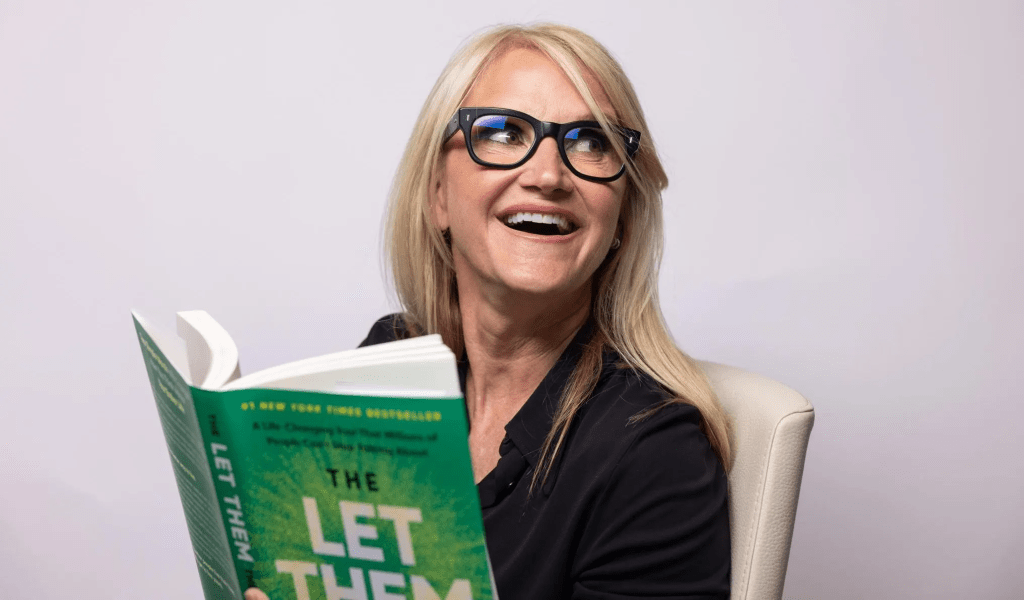Moira Forbes, EVP of Forbes, sits down with Mel Robbins, Award Winning Podcast Host and Best-Selling Author, for an insightful conversation about pivotal career moments, her book “The Let Them Theory,” and understanding your own power.

Power is often confused with control. The instinct to manage outcomes, influence how others behave, and keep everything in place can easily be mistaken for strength. But real power, Mel Robbins suggests, may begin with the choice to stop carrying what was never ours to hold in the first place. That idea sits at the center of The Let Them Theory, the latest book from the bestselling author and podcast host known for turning personal challenge into practical frameworks with wide appeal. Co-written with her daughter Sawyer, the book offers a kind of radical simplicity. Let people feel what they feel. Let them judge, misunderstand, or disagree. The point isn’t detachment but learning how not to lose yourself in the process of managing someone else.
At 56, Robbins describes herself as being in a “peak moment,” a result, she says, of stepping back from what no longer serves her. She first gained wide recognition with her 2017 book The 5 Second Rule, based on a behavioral technique she developed during what she has called her “rock bottom” in her 40s, a period marked by both personal and financial crisis. That book went on to sell millions of copies and established her as a voice of action, helping people disrupt hesitation and move forward. With The Let Them Theory, Robbins turns her attention to a different kind of challenge, examining the weight we carry out of habit and asking what it means to release what was never ours to manage, not by force but by choice.
“This isn’t about letting go,” said Robbins in a recent Forbes interview. “I’ve never been able to let anything go. But when you say, ‘let them,’ you’re not giving in. You’re opting out of the noise. You’re stepping back into your own life.”
That clarity has shaped much of Robbins’ appeal. A former attorney and CNN legal analyst, she didn’t come up through academic theory or clinical training. Her reach came through candor, naming the emotions people navigate every day but rarely voice from fear to inertia, shame and resentment. Her tools caught on not because they were novel, but because they were usable.
The “let them” message reflects a turn in her approach, shifting from tactical advice to a broader rethinking of where we invest our energy and why. The book took shape during the pandemic, as Robbins began to examine long-entrenched habits of overexplaining, overfunctioning, and absorbing what didn’t belong to her.
Writing with her daughter made the process more personal and, at times, more charged. “We’d argue, storm off, come back, and keep writing,” Robbins said. “But that tension made the book better. It made it honest.” That honesty is part of what’s resonating. “I’ve been the overbearing mom. The jealous friend. The fixer,” she said. “This book is about what happens when you finally stop trying to be all of those things.”
Since its release, “let them” has become cultural shorthand, passed through group chats, executive teams, wellness circles, and everyday conversations. It hasn’t spread as a trend, but as a kind of quiet permission to stop absorbing other people’s reactions and to direct your energy with greater intention. Part of its power lies in how deeply Robbins’ message already resonates. What sets her apart isn’t just the scale of her audience, but the depth of connection she creates. Her videos have been watched billions of times, her books have topped bestseller lists, and her self-produced podcast consistently ranks as the most downloaded education show across major platforms.
When Oprah Winfrey received an early copy, she read it cover to cover, marked it with dozens of tabs, and called it “generation-defining.” For Robbins, it was a surreal moment, but also a form of recognition. “I realized this wasn’t just a book,” she says. “It was a language people didn’t know they needed.”
“You’re not letting people off the hook,” explains Robbins. “You’re letting yourself off the hook. You stop trying to fix, manage, prove. And you start protecting your peace.” For Robbins, clarity over control is at the heart of power. “When your thoughts, emotions, and actions are aligned with your values,” she says, “that’s when you feel strongest. It’s not about doing more. It’s about being more honest. More grounded. More yourself.”
The Let Them Theory doesn’t offer a system or a solution. It offers something steadier—a return to what’s yours, and a release of what isn’t. In a culture that equates busyness with value and burnout with success, Robbins is making a different case built not on striving, but on knowing when to stop.
Watch the full Mel Robbins interview and more from the Power Women Profiles series here.
This article was originally published on forbes.com and all figures are in USD.
Look back on the week that was with hand-picked articles from Australia and around the world. Sign up to the Forbes Australia newsletter here or become a member here.


